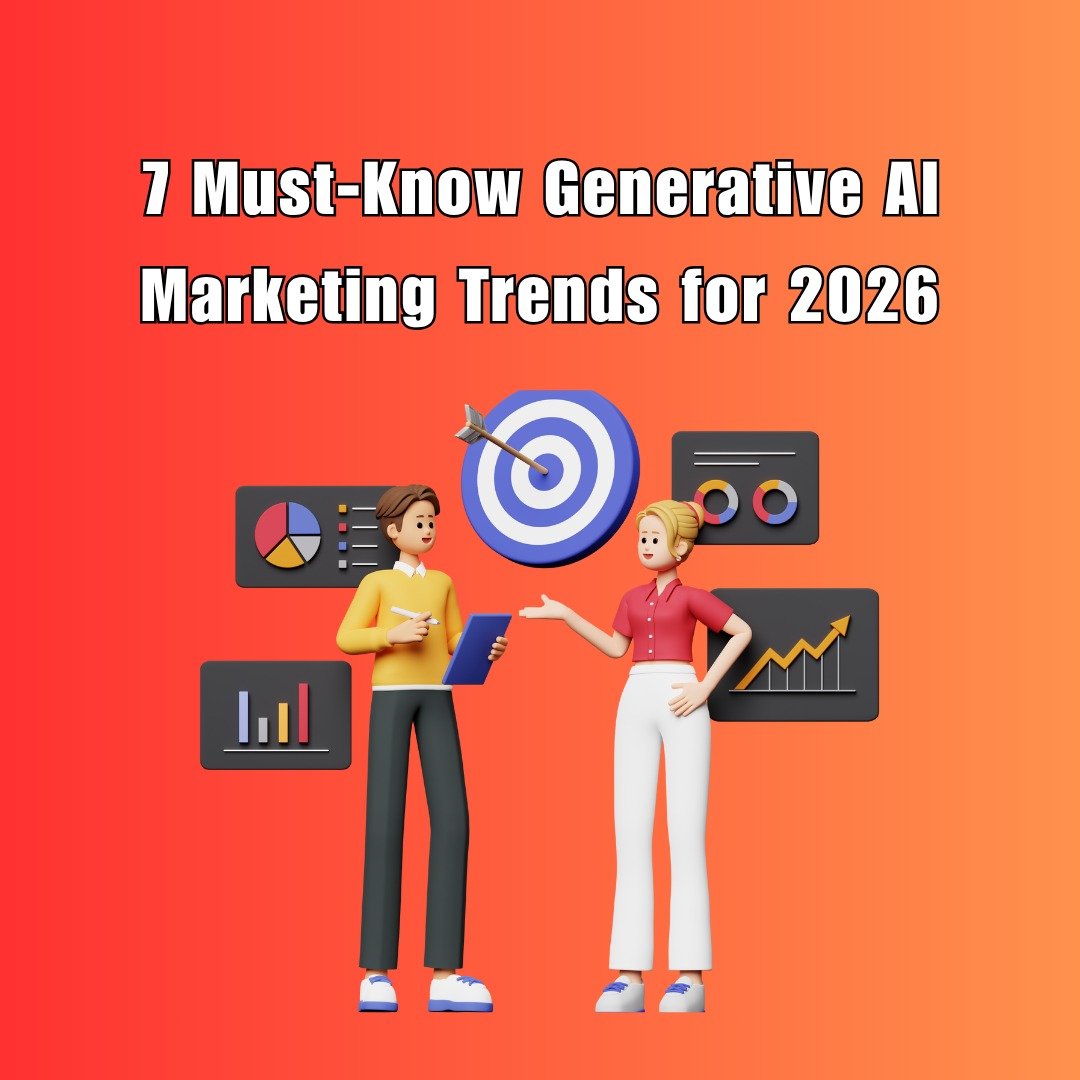Generative AI is reshaping the digital marketing landscape faster than any technology before it. From personalized ad campaigns to predictive content strategies, AI-powered tools are transforming how brands communicate, create, and convert. As we approach 2026, marketing professionals must stay ahead of these evolving trends to remain competitive and relevant.
Here are seven must-know generative AI marketing trends that will define success in 2026 and beyond.
1, Hyper-Personalized Content Creation
Gone are the days of one-size-fits-all marketing. In 2026, generative AI will enable marketers to produce ultra-personalized content for every audience segment.
AI tools can now analyze user behavior, purchase history, and online activity to craft individual messages, visuals, and recommendations. For example, an e-commerce brand can use AI to create unique product descriptions or social media captions tailored to each user’s preferences.
This level of personalization enhances engagement, increases conversion rates, and strengthens brand loyalty. Businesses that harness this trend will create marketing experiences that feel truly human while being powered by intelligent automation behind the scenes.
2, AI-Generated Video Marketing at Scale
Video remains the most consumed form of digital content, but creating it can be time-consuming and expensive. Generative AI is changing that completely.
By 2026, marketers will rely on AI-driven video platforms that automatically generate storyboards, voiceovers, and realistic avatars. Brands will be able to produce hundreds of video variations for different demographics or regions — all in minutes.
For example, an AI tool might produce short explainer videos featuring different languages, tones, and visuals for each audience. This not only reduces production costs but also accelerates campaign timelines. The future of video marketing will be faster, smarter, and infinitely scalable.
3, Predictive SEO and Automated Optimization
Search engine optimization is evolving rapidly, and traditional keyword-based strategies are no longer enough. With Google’s generative search and AI-driven algorithms, marketers must adapt to a new era of predictive SEO.
Generative AI tools can analyze search intent, forecast trending queries, and automatically optimize website content for future search opportunities. Instead of reacting to algorithm updates, marketers will be able to anticipate them.
AI writing assistants can generate optimized headlines, meta descriptions, and FAQs that align with user intent. In 2026, SEO will shift from manual keyword research to a data-driven, predictive process that ensures brands stay ahead of the curve.
4, Voice and Conversational AI Marketing
Voice search continues to grow, and conversational AI will dominate customer interactions in 2026. Smart assistants like Alexa, Siri, and Google Assistant are evolving into full-fledged marketing channels.
Generative AI allows brands to design natural, human-like dialogues that can respond dynamically to voice queries. From product recommendations to customer support, AI chatbots and voice agents can manage thousands of interactions simultaneously while continuously learning and improving.
For digital marketers, this means optimizing for conversational queries and integrating voice search into SEO and content strategies. Businesses that adopt conversational AI early will enjoy higher engagement and improved customer satisfaction.
5, AI-Powered Ad Campaigns and Predictive Targeting
Advertising is becoming smarter than ever thanks to generative AI. Traditional ad campaigns depend heavily on manual analysis and testing, but AI now automates these processes.
In 2026, ad platforms will use generative AI to predict user intent, generate ad creatives, and adjust bids in real time. Marketers will be able to feed campaign data into AI tools that design visually appealing, high-performing ad variants optimized for every target segment.
Predictive targeting enables advertisers to reach the right audience even before they express interest by using behavioral data and AI-based forecasting. The result is higher ROI, lower ad spend, and more relevant ad experiences across platforms like Google and Meta ,etc.
6, Ethical and Transparent AI Marketing
As generative AI becomes mainstream, ethical use and transparency will be crucial in 2026. Audiences are increasingly aware when brands use AI tools to generate content, and they value authenticity.
Marketers must ensure that AI-generated materials maintain brand voice, accuracy, and ethical integrity. Disclosing AI use when appropriate can build trust rather than suspicion. Moreover, with growing regulations on AI content, compliance and responsible usage will define successful digital marketing strategies.
The winners of 2026 will be brands that use AI responsibly, balancing automation with authenticity and creativity.
7, Integration of AI with AR and Immersive Experiences
The next major frontier of generative AI in marketing lies in immersive, multi-sensory experiences. By 2026, marketers will combine AI with augmented reality and virtual reality to create deeply interactive campaigns.
Imagine virtual product try-ons powered by AI or AR filters that adapt in real time based on user emotions. Generative AI can design 3D assets, visuals, and storylines that make these experiences personalized and engaging.
Brands in fashion, real estate, travel, and entertainment are already investing in AI-driven immersive storytelling, and this integration will soon become a marketing standard.
Why Marketers Must Adapt Now
The evolution of generative AI is not just about adopting new tools; it is about rethinking marketing from the ground up. AI does not replace creativity — it amplifies it. Marketers who embrace these innovations early will not only streamline workflows but also craft campaigns that feel more human, timely, and impactful.
To stay ahead in 2026:
Leverage AI tools for smarter content creation and analytics.
Combine automation with authentic storytelling.
Prioritize data ethics and brand transparency.
Keep learning, experimenting, and adapting to emerging AI trends.
Generative AI is not a passing trend; it is the foundation of the future marketing ecosystem. By mastering these seven trends today, brands can ensure success, relevance, and growth in 2026’s hyper-intelligent digital world.
Final Thoughts on Generative AI Marketing
Generative AI is rewriting the rules of digital marketing, from SEO and advertising to personalized content and immersive experiences. In 2026, the most successful brands will be those that integrate AI seamlessly while maintaining human creativity and trust.
The message is clear: adopt early, innovate boldly, and let AI power your marketing success story in 2026 and beyond.


